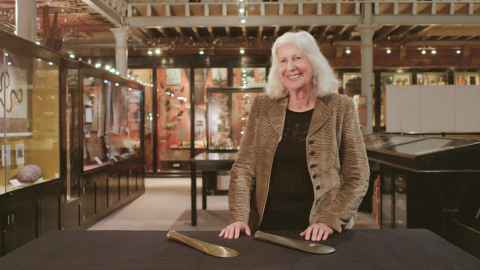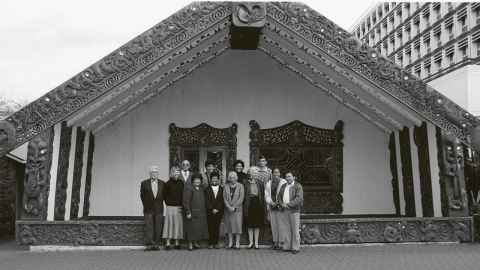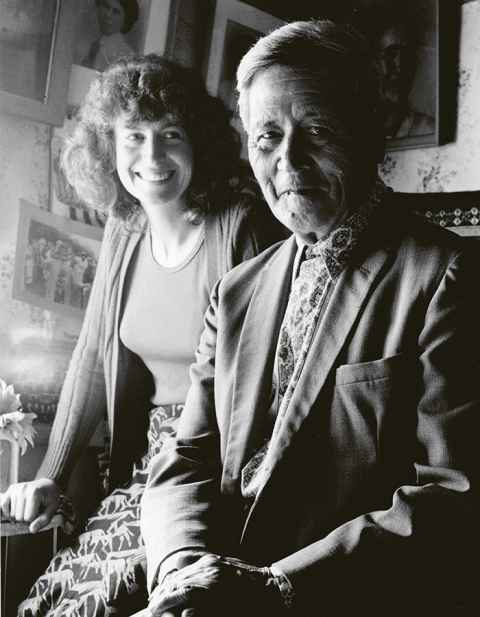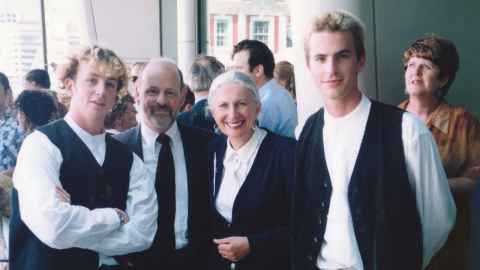Navigating a pathway through a changing land
5 December 2023
A trip back through 40 years of thinking and writing about Māori, Pākehā and Pacific worlds, and the places they meet, is the wide-ranging scope of Dame Anne Salmond’s latest book.

Knowledge Is a Blessing on Your Mind: Selected Writings, 1980-2020 (AUP, 2023) is a collection of University of Auckland Distinguished Professor Dame Anne Salmond’s writings since 1980, which includes excerpts from her many books and essays, as well as previously unpublished work.
Richly illustrated with photos from the Salmond family archive, the book traces Dame Anne’s journey as an anthropologist, writer and activist, as a Pākehā New Zealander, and as a friend, wife and mother; bringing together her key writing on the Māori world, the environment, cultural contact, Te Tiriti and the wider Pacific.
She also embeds these writings in her life as it was at various points – family, travels, friends – by adding a brief introduction ahead of each excerpt explaining what was going on for her when she wrote it.
“It was my husband Jeremy’s idea, I couldn’t have done it without him. It ended up being a fun thing to write because Jem and I were working on it together during the lockdowns before we knew he was ill. Luckily, he could remember some things I couldn't because we did so much of it together.”
She says Jeremy, an award-winning architect who passed away in January 2023, had most of the photos on his computer, so it was a “perfect lockdown project”.
“It’s always useful to have two people thinking about it and, equally, I was able to check in with other people as well. It turns out my memory was pretty accurate, which was a relief.”

The book is dedicated to notable educator and University of Auckland te reo Māori lecturer Merimeri Penfold, whom Dame Anne worked with alongside Patu Hohepa, Wharetoroa Kerr and others to establish Waipapa Marae at the University in the 1980s.
“Merimeri was my other great mate on the journey. She taught me so much and we became really close friends. There was institutional racism at the University in the 1980s and looking back on what I said at the time, [in a 1983 essay included in the book] I still agree with it; it wasn’t personal, it was just pointing out the lack of any significant Māori presence on campus.”
She pays tribute to the then vice-chancellor Colin Maiden for the way he responded to the student occupation of the University registry, a protest about lack of action on the establishment of a marae.
“The students just wanted him to come out and talk to them, and that’s what he did.”
The University is woven through the whole book, she says.
“I did my PhD at the University of Pennsylvania, then came back and became a lecturer in anthropology; I’ve been to a lot of other places [Cambridge University among them] but it’s been a constant thread, there’s quite a lot of University of Auckland history in the book.”
Dame Anne says she has come to the point where “recognition doesn’t matter” after a string of honours, including New Zealander of the Year, the Rutherford Medal from Royal Society Te Apārangi, being made Dame Commander of the British Empire in 1995 and Member of the Order of New Zealand in 2020.
“Recording some of the steps we’ve been through as a country is much more important.”

It all started, she remembers, with concern for the environment.
“I was on the Parks and Wilderness Trust and was involved in a review of the Auckland Regional Council, where I saw a lot of politics at play. It was at the height of the neoliberal revolution, and as an anthropologist in my own country, I found the dynamics fascinating.”
And that concern, and interest, continues. One of her latest large-scale projects, Recloaking Papatuanuku, focuses on how we can best offset our carbon emissions and is, she says, “a creative alternative to spending billions of dollars offshore on international credits”.
“We don’t think that’s a good investment. We can do a much better job here at home helping to live up to our clean, green image, restoring waterways and Indigenous forests, cleaning up rivers, providing habitat and making our farms more sustainable.”
She says anthropology is a kind of comparative philosophy, where you’re always thinking about different ways of living in the world, as well as about what works and what doesn’t. She worries that with a new government having a ‘review of Treaty principles’ high on its agenda, the resulting discussions, actions and response to them may drive New Zealand towards division.
She also feels that left and right in Aotearoa is a false dichotomy.
“There are people in the middle ground who want things to be successful, tranquil, productive, creative. I would say most Kiwis are in that frame but that’s getting splintered and it feels dangerous.”
She believes, however, that leaders have to be attentive to all the people they’re leading, not just a few of them. The Waitangi Tribunal, for example, where she gave evidence on the Treaty’s meaning in the 2000s, was an initiative where “people basically agreed it was a fair enough thing to do,” she says.
“But with something like He Puapua, [a report commissioned by the government in 2019 to respond to the UN Declaration of the Rights of Indigenous Peoples] I don’t think the government took people with them, unfortunately.”

Rights and progress for disenfranchised groups are fragile, Dame Anne fears, recalling a speech she gave at parliament on an International Women’s Day, making the point that you can never take gains for granted.
For example, she says, the kinds of gains that women – in western countries in particular – have made in recent decades can be rolled back; as they were for Māori women who had land and leadership rights at a time when European women didn’t, but lost them with arrival of the colonists, alongside their male counterparts.
“There’s been a generosity of spirit about this country, a fundamental decency and common sense that I’ve always valued, and mostly it’s a bedrock but it feels like it’s being eroded.”
So will there be another book?
“No doubt I’ll do something for Jeremy.”
Knowledge Is a Blessing on Your Mind: Selected Writings, 1980–2020 by Anne Salmond, featuring excerpts from books like Hui, Eruera and The Trial of the Cannibal Dog, was published on 9 November 2023 in hardback by Auckland University Press and is available in all good bookstores and online for $65.